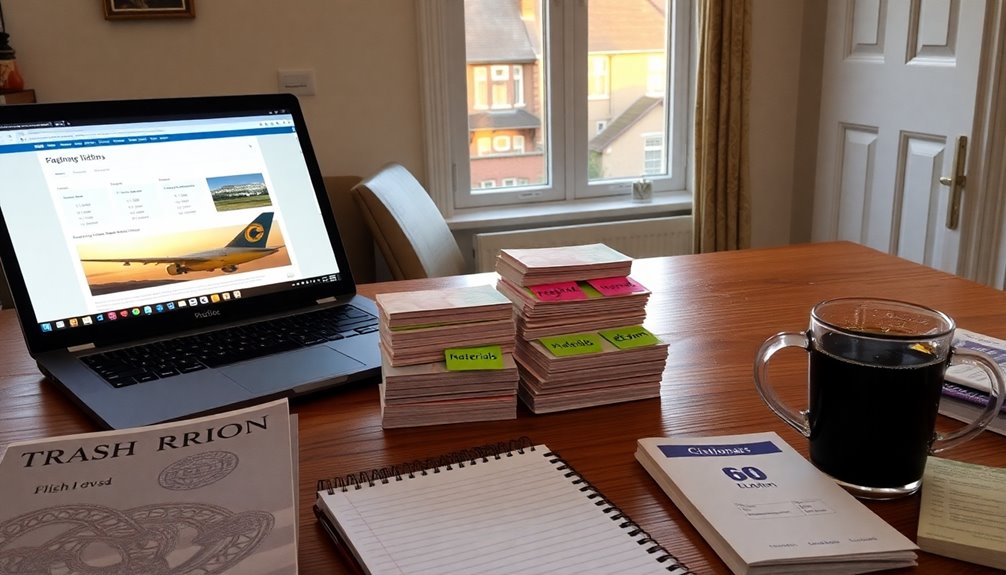
You can study English in Ireland on a tight budget by choosing smaller cities, mixing group classes with occasional private lessons, and booking intensive weeks only when you can handle them. Pick shared flats or homestays near transit to cut rent, cook most meals, and use student or weekly transport passes. Hunt early-bird deals, scholarship options, and bundled course-plus-housing savings. Plan a weekly budget, leave a small emergency fund, and keep flexible — more practical tips follow.
Highlights
- Choose cities with lively culture but lower rent (e.g., Cork, Galway) to stretch your summer language budget.
- Opt for group classes or intensive short courses for lower hourly rates and faster progress.
- Save on housing by sharing flats or booking homestays outside city center with good transit links.
- Cut daily costs via cooking, discount supermarkets, student transport passes, and lunchtime meal deals.
- Hunt early-bird discounts, scholarship opportunities, and tuition-plus-housing bundles to reduce overall expenses.
Choosing the Right City for Affordable Study
Looking for an affordable city to study in Ireland? You’ll want a place where city culture feels alive but living costs don’t tie you down. Think about transportation, shared housing, and nearby markets so you can keep spending flexible. Visit neighborhoods at different times to gauge noise and vibe; chat with students about safe, cheap eats and study spots. Prioritize cities with free or low-cost local attractions — parks, galleries, community events — that let you relax without a big budget. That way your course fits your goals and you keep the freedom to explore on your terms.
Comparing Course Types and Hourly Costs
Now you’ll compare common options like group classes versus private tuition so you can pick what fits your learning style and budget. Consider how intensive course pricing raises the hourly rate but speeds progress, and weigh that against longer, cheaper group sessions. Also watch for hidden fees—materials, registration, exam costs and activity charges—that can change the true hourly cost.
Group Classes vs. Private
Because your goals and budget shape the experience, choosing between group classes and private lessons comes down to trade-offs in cost, pace, and interaction. You’ll save per hour in group settings, benefit from lively group dynamics, and practice real conversation with peers — great if you want social learning and flexibility. Private lessons cost more but give dedicated, personalized attention so you progress faster and focus on specific needs. Consider splitting time: group mornings for immersion, private afternoons for targeted feedback. Pick what keeps you motivated and free to explore Ireland, balancing wallet and learning speed for the experience you want.
Intensive Course Pricing
While your choice between group and private lessons affects cost, what really matters for budgeting is how many contact hours you want: intensive courses pack more hours per week and so change the effective hourly rate. You’ll compare options by calculating cost per hour and weighing intensity against stamina. Read intensive course reviews to gauge real pacing and teacher quality, then match that to your travel plans. If you crave freedom, look for schools offering course duration flexibility so you can scale weeks up or down. That way you control immersion without overcommitting money or time. Make choices that fit your rhythm.
Hidden Fees and Extras
When you compare course types and hourly rates, don’t forget that advertised prices often omit extras that change the true cost per hour. You’ll want to list inclusions so unexpected costs don’t bite your budget: registration fees, materials, exam fees, and facility surcharges. Private lessons raise hourly rates but may bundle additional services like airport pickup or tailored materials — inspect those too. Group classes look cheap until you add weekend excursions or social activities. Decide what freedom matters: lower headline price or fewer surprises. Request a full breakdown before you commit so you can compare real hourly value confidently.
Accommodation Options and Monthly Expenses
If you’re planning to study in Ireland for the summer, choosing the right accommodation will shape both your daily routine and your budget, so it’s worth comparing options carefully. You’ll weigh student residences, homestays, shared accommodations and local hostels against privacy and cost. Expect city-center rooms to cost more; suburbs save rent but add transit time. Budget about €500–€900 monthly for shared flats, €600–€1,200 for private rooms, and €350–€600 for longer-stay hostel deals. Look for utilities, Wi‑Fi and deposit policies upfront. Choose what gives you independence without overstretching your funds.
Food, Groceries, and Eating Out on a Budget
Because food will be one of your biggest day-to-day expenses while studying in Ireland, it’s worth planning meals and shopping smart to stretch your budget without missing out on local flavors. You’ll save by practicing budget meal planning: batch-cook, use seasonal produce, and shop discount supermarkets or farmers’ markets late in the day. Look for student deals, lunchtime specials, and street food for cheap, tasty options. Balance cooking and eating out to enjoy pubs and cafés without overspending. Keep a simple grocery list, try shared meals with flatmates, and be adventurous—local dining options often surprise you with affordable, delicious choices.
Transport Costs: Getting Around Ireland Cheaply
Although distances in Ireland can seem short on a map, getting around affordably takes a bit of planning, and you’ll save most by mixing public transport, walking, and smart ticket choices. You’ll find buses, trains, and trams link cities and towns reliably; grab a weekly or student pass for savings. Walk or cycle locally to enjoy freedom and cut costs. For late nights or rural legs, try ride sharing apps or local lift boards to split fares. Book intercity tickets in advance, compare providers, and keep flexible itineraries so transport doesn’t limit your language-adventure budget.
Hidden Fees: Registration, Materials, and Exam Charges

Walking and cheap transport will save you money on the ground, but don’t assume course costs stop at tuition and travel — schools often add registration, materials, and exam fees that can bump your budget. You’ll want to ask upfront about registration fees, book costs, and whether materials are digital or printed. Factor in optional extras: study guides, placement tests, and resits. If you plan to take a certificate, check exam costs and local test dates. Budget a small contingency for unexpected charges so you can stay flexible and free to enjoy learning without surprise expenses.
Part-Time Work and Legal Considerations for Students
If you want to work while studying in Ireland, it’s important to know the legal limits, visa rules, and how to balance hours with coursework so you don’t jeopardize your studies or status. You’ll check your student visa conditions first: some courses allow limited hours, others don’t. Learn whether work permits are needed for your situation and register with tax authorities to meet tax obligations. Know your employment rights, like minimum wage and safe conditions. Plan shifts around classes, keep records, and ask your school’s adviser if unsure. Working can fund freedom, but stay legal and focused.
Money-Saving Student Discounts and Passes
Many students find that a few smart discounts and passes can dramatically stretch a summer budget in Ireland — from transport and museums to food and phone plans. You’ll want to hunt down discount cards (ISIC, Dublin student passes) and join student loyalty schemes at cafés and shops; they add up fast. Pick a transport pass for buses and trains if you’ll travel between towns. Use museum student rates and weekday deals for activities. Keep copies of your ID and receipts on your phone. These small choices give you mobility and spontaneity without overspending, so you can enjoy Ireland freely.
Budgeting Tools and Weekly Spending Plan
A few simple tools will make it a lot easier to stick to your summer budget in Ireland: set up a weekly spending plan, track expenses with an app or spreadsheet, and use alerts to avoid overspending. You’ll feel freer knowing limits are practical, not restrictive. Choose budgeting apps that sync to your cards, categorize purchases, and let you set weekly targets. Update a simple spreadsheet if you prefer control. Practice quick daily logging and a weekly review to adjust transport, food, and leisure allowances. Financial tracking becomes habit, so you relax more and still explore without money worries.
Seasonal Deals, Scholarships, and Early-Bird Savings

Because planning ahead can shave serious costs off your trip, hunting seasonal deals, scholarships, and early-bird offers should be part of your prep routine: sign up for program newsletters to catch limited-time discounts, apply early for institutional or external scholarships that award funds on a rolling basis, and book courses or accommodation during promotional windows when providers reduce fees to fill spots. You’ll want to track deadlines, compare bundles (tuition plus housing), and set alerts for flash sales. Prioritize scholarship opportunities that match your profile, and be ready to commit when seasonal savings appear so you keep options open and travel lighter.
Some Questions Answered
How Do I Apply for a Student Visa From My Country?
You apply by checking your destination’s student visa application process online, then submitting the visa application with the required document requirements: passport, acceptance letter, financial proof, and insurance. You’ll book any biometrics appointment, pay fees, and track your case. Be practical: double-check translations, photocopies, and timelines so you’re free to travel when approved. Stay organized, follow embassy instructions, and contact them if anything’s unclear.
Can I Bring a Partner or Family on My Student Visa?
Yes — but don’t assume it’s simple. You’ll need to check partner visa options and family visa requirements early, since rules and income thresholds vary. If you’re on a short course visa you probably can’t bring dependents; longer study visas may allow spouses and children with proof of accommodation, funds, and relationship evidence. Be practical: confirm specifics with Irish immigration, prepare documents, and plan financially so your loved ones can join you.
Are Medical Expenses Covered by Travel Insurance in Ireland?
Yes — travel insurance usually covers medical coverage in Ireland, but check limits and exclusions. You’ll want a policy that includes emergency treatment, hospital stays, and medical evacuation if needed. Look for reasonable excess, cover for pre-existing conditions if relevant, and repatriation. Compare providers, read the fine print, and carry policy details and emergency numbers. That way you’ll stay free to explore without worrying unexpected healthcare bills.
What Cultural Activities Are Included in Language Courses?
About 78% of students report improved cultural understanding after courses, and you’ll typically get guided cultural immersion like city walking tours, homestays, music sessions, and cooking classes. You’ll explore local traditions at festivals, museums, and storytelling nights, plus practical workshops on etiquette and language in everyday settings. You’ll have chances to choose free-time excursions, volunteer options, and social meetups, so you’ll shape experiences that fit your curiosity and need for freedom.
How Do Currency Exchange Rates Affect My Budget Abroad?
Currency exchange rates can raise or lower your actual costs, since currency fluctuations change how much local goods and services cost in your home currency. You’ll want budgeting strategies like tracking rates, converting a buffer, using multi-currency cards, and timing larger exchanges when rates favor you. It’s practical to set alerts, compare fees, and keep some cash plus a flexible reserve so you can freely enjoy experiences without money stress.
Summing Everything Up
You’ve got this — choose a cheaper city, pick courses at €10–€25 per hour, and watch savings add up. One surprising stat: students who plan weekly budgets cut overspend by 30%, so schedule costs for rent, food, transport and extras. Mix homestays, cook more, use student passes and casual work where allowed. Stay alert for scholarships and early-bird deals, and use budgeting apps to keep every euro on track.
